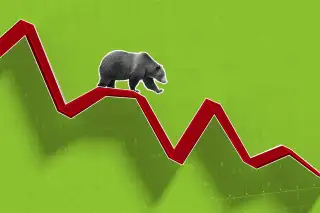Does This Bear Market Mean a Recession Is Coming?

A bear market is bad enough. But there's some more bad news in store: Bear markets are typically followed by recessions.
During the last half century, bear markets were accompanied by recessions 83% of the time, according to an analysis by Morningstar vice president of research John Rekenthaler. The National Bureau of Economic Research (NBER), which declares when U.S. recessions begin and end, defines a recession as "a significant decline in economic activity that is spread across the economy and that lasts more than a few months." The typical metric used is quarterly gross domestic product (GDP), the value of goods and services produced in the U.S.
The S&P 500 — a benchmark commonly used to measure how stocks are doing overall — entered a bear market last week, meaning that its value fell at least 20% from the previous high. The index is currently down around 22% for the year as investors asses what interest rate hikes and sky-high inflation mean for their portfolios. The Federal Reserve hikes interest rates to bring down rising costs — but there's always the chance that raising rates can tip the economy into a recession.
Right now, that's definitely a concern. This week, Tesla CEO Elon Musk called a U.S. recession "inevitable" in an interview with Bloomberg News, and said it's more likely than not that we'll see one in the near term.
JPMorgan Chase & Co. CEO Jamie Dimon has warned of an economic "hurricane." In June, nearly 40% of 49 macroeconomics experts polled by The Financial Times and the Initiative on Global Markets at the University of Chicago’s Booth School of Business said a recession will be declared in the first half of 2023, and nearly a third said it would happen in the second half of next year.
Even Fed chairman Jerome Powell said a recession is "certainly a possibility," while testifying to the Senate Banking Committee this week.
Will we have a recession this year?
While Rekenthaler notes that five of the six previous bear markets were followed by recessions, he says there are some caveats.
If we look at the last 10 times the stock market fell at least 18% — not quite the 20% required to be considered a bear market — four of the downturns weren't followed by a recession, two accompanied "mild recessions" and only four were associated with what Rekenthaler characterizes as "the real thing."
"By this measure, the odds of a truly bad outcome decline to 40%, as opposed to the original 83%," Rekenthaler wrote in his analysis. "Better news indeed."
He also points out the recession associated with the dot-com bubble bursting in 2000 was short and shallow.
What does this mean for the present day?
As of now, economic experts remain split on whether we'll experience a recession — or whether or not we're already in one, since the NBER doesn't call them in real time. Despite the gloomy predictions from CEOs like Dimon and Musk, business research firm The Conference Board believes that GDP will be positive next quarter. While that could be over-optimistic, Rekenthaler says "the signs of a recession are further removed than they were during the bear markets of 1974, 1982 and 2008." For instance, bear market recessions tend to arrive after the unemployment rate begins to increase, which we're not seeing.
Rekenthaler concludes that while a recession this year is certainly a possibility — and becomes even more so with every interest rate hike — he remains upbeat about near-term economic signals. "History suggests that the current bear market is likely a false alarm," he says.
More from Money:
The One Type of Stock That's Booming During the Bear Market